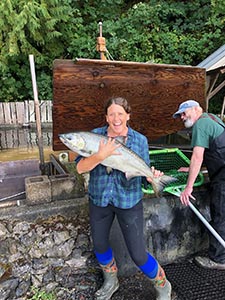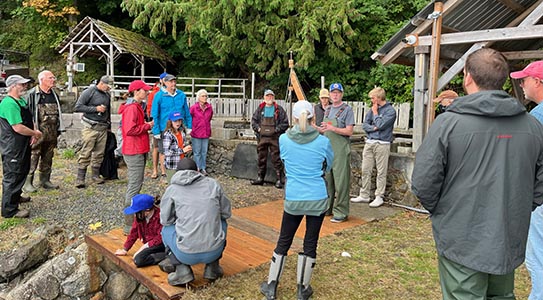Tickets are now available for this annual celebration on Orcas Island
||| FROM LISA TERRY for LONG LIVE THE KINGS |||
The first salmon of the season have made it home to Eastsound and up the fish ladder at Glenwood Springs on Orcas Island!
Each year, Long Live the Kings throws a party to celebrate the return of Chinook salmon and thank the volunteers on Orcas Island who help make our work on Orcas Island possible.
This year, the event, called Return of the Kings, is going to be on Saturday, September 21 from 12-3 pm at Glenwood Springs (1649 Olga Rd, Eastsound, WA 98245). There will be tours of the hatchery, a cook-out, and a chance to see the salmon! It’s an all-ages event and families are welcome. The event is free (with a suggested donation of $50). Reserve your spot at the event at https://lltk.org/events/2024-return-of-the-kings.

The Glenwood Springs Chinook program began as an experiment. In 1978, Long Live the Kings founder Jim Youngren wanted to see if he could create a Chinook run from a small stream. Nearly 40 years later, up to 4,000 Chinook return annually to be harvested in fisheries from Alaska to Northern Puget Sound. These Chinook help nourish our local population of endangered orca whales.
Every year, we release 750,000 juvenile Chinook from Glenwood Springs Hatchery—an amazing feat, given how little water is used. This success is due in large part to an expansive network of natural rearing ponds, and to reliable sources of cold spring water that keeps our fish healthy.
Glenwood Springs Hatchery is a true community effort. About 20 people volunteer annually to spawn the large Chinook that return, mark juveniles to be identified as hatchery origin in fisheries, and help maintain the facility.
For more information about our project at Glenwood Springs, visit https://lltk.org/project/glenwood-springs-chinook.
About Long Live the Kings: Long Live the Kings is a non-profit salmon recovery organization based in Seattle. Since 1986, they have been working to restore wild salmon and steelhead and support sustainable fishing in the Pacific Northwest.
**If you are reading theOrcasonian for free, thank your fellow islanders. If you would like to support theOrcasonian CLICK HERE to set your modestly-priced, voluntary subscription. Otherwise, no worries; we’re happy to share with you.**







